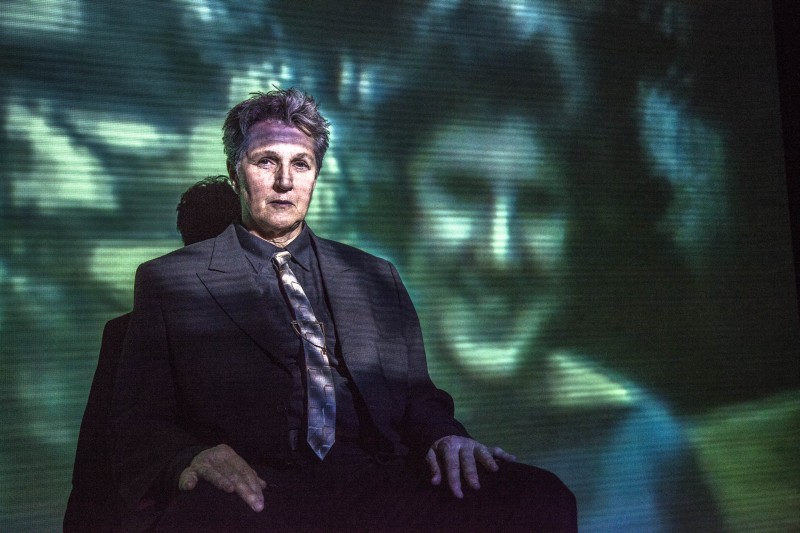 Bits of the brain go dark. The memories they contain disappear. Speech, thought, up and down: all scratch and twist and fail. What do you do? In this case the artist continues to do what they almost cannot do, nothing else is possible. In January 2011 Peggy Shaw suffered two strokes, and as one half of Split Britches, then turned them into a show, just as she turns a joke into a broken neck into a joke. In a company whose collaboration is this long standing there is a seamlessness to the authorship of the work and Lois Weaver’s direction turns us always to the centre of the show: its performer.
Bits of the brain go dark. The memories they contain disappear. Speech, thought, up and down: all scratch and twist and fail. What do you do? In this case the artist continues to do what they almost cannot do, nothing else is possible. In January 2011 Peggy Shaw suffered two strokes, and as one half of Split Britches, then turned them into a show, just as she turns a joke into a broken neck into a joke. In a company whose collaboration is this long standing there is a seamlessness to the authorship of the work and Lois Weaver’s direction turns us always to the centre of the show: its performer.
To begin Peggy plays with failure like a tragic clown, riding the flops. In contact with the audience she is light, playful, full of life. Only her memory is shot through with holes.
When I first saw her perform in 2010 it was as if I could see her entire life extending behind her, everything she had ever known was present on stage and concentrated in her face, that smile, it radiated out over the audience. Wild associations crackled through my brain: the 1950s, rock & roll, 20s jazz, beat poetry, New York, steam, crowded bars, film noir, smoke, cramped apartments, chaotic friends, black and white TV, tears, revolution, beauty, broken hearts, tenacity, bedrock, impossible dreams, fierce coals glowing with heat. Her timing was immaculate, nuanced, almost impossible, how could someone be this much like themselves?
Now I saw what had been lost laid bare, felt the rhythm cracked and jarring, because now Peggy can’t carry us suspended in the dreams she wove with the contact she gave. Now the show won’t stay put in her head. So it is the simple, declared, device of prompting screens bearing the lines of the show, which draws her attention away from us. If before we got to float, carried smoothly by the master performer, now we are lifted and dumped back into our seats each time she averts her eyes.
This is absolutely necessary, this is the show she has to make now because this is where she is, alone. There is no pretence, only an honest vulnerability. It is not even determination that brings her to the stage because that implies a struggle with another possibility. Performing is so much a part of Peggy that there is a simple inevitability, of course she would continue. Behind it all that smile, the passion to tell a story of loss and recovery.
So with screens as aides, extra voices, and supplementary memory Peggy pulls herself through an uncertain landscape. There are people and words missing now. Humour fades, is swamped and returns as we jump between green screen projections, adopted characters, playful public service announcements, self reflections and shifting images. Not everything works or is easy to follow, some of the projections clunk rather than clang, perhaps you need to know a bit about Peggy’s herstory to fully grasp certain references, and every time she looks at the screens instead of the audience it feels like a robbery, but you might as well complain about night becoming day.
If you live long enough you will lose yourself. The person you were will die and you will be left alive. There only remains the question: what you will do then?

